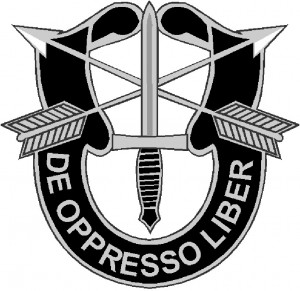 This document, linked in this post, is official Army doctrine on Special Forces operations. It will be very boring to those of you looking for a JADE HELM smoking gun, or even a lot of nuts and bolts about how SF does things; most of those details live in team and unit SOPs, and those don’t circulate beyond the community.
This document, linked in this post, is official Army doctrine on Special Forces operations. It will be very boring to those of you looking for a JADE HELM smoking gun, or even a lot of nuts and bolts about how SF does things; most of those details live in team and unit SOPs, and those don’t circulate beyond the community.
FM 3-18 is less than a year old and covers many thing better than previous editions of itself and its forerunner (FM 31-20 and 31-21). Among the things it covers better is SF integration with ARSOF and joint conventional forces, and it even includes an excellent and accurate recounting of SF origins and history.
Special Forces units are oriented to specific missions and regions. This drives their area studies, contingency mission planning, and language and cultural training. A unit’s area orientation is expressed in mission tasking letters, which are classified documents. Until relatively recently, the general orientation of specific SF elements to specific unified combatant commands was classified SECRET, even though it was very widely known and ridiculously easy for anyone to figure out. In this unclassified document, the regional orientations (which are adjusted from time to time) finally come out of the closet. Old-timers will note the disappearance of LANTCOM; its mission and responsibilities were divided among NORTHCOM, EUCOM, and Joint Forces Command (JFCOM) beginning in 1993; JFCOM has since been disestablished.
In addition to the Special Forces units, some other ARSOF and other services’ SOF plan to fall in on specific commands in specific contingencies, but none has the highly developed, long-standing and persistent area orientation of Special Forces.
There are many key ideas to be distilled from this document, for instance:
The following five criteria provide guidelines for conventional and SF commanders and planners to use when considering the employment of SF:
- It must be an appropriate SF mission or activity. SF should be used to achieve effects that require its specific skills and capabilities.
The mission or tasks should support the [Joint Force Commander’s] campaign or operation plan or special activities.
- The mission or tasks must be operationally feasible. SF is not structured for attrition or force-on- force warfare and should not be assigned missions beyond their capabilities.
- Required resources must be available to execute the mission. Some SF missions require support from other forces for success.
- The expected outcome of the mission must justify the risks. Commanders must make sure the benefits of successful mission execution justify the inherent risks.
Doctrine like this is catnip to force and strategic planners. It tells them what units can and can’t do; it alerts them to the range of practical possibilities. With any luck it fires their imagination.
SF has evolved a good bit since we first darkened their door in the long black night of the Carter Administration. In the 1980s, SF avoided disbandment by offering commanders the capability to conduct deep strike and strategic or special reconnaissance. Despite the wonderful array of technical intelligence, surveillance and reconnaissance systems today, there has proven to be no substitute for intelligent, American (or American-controlled), human eyes on target. SF has proven to be a great distributor of “ground truth.” But the evolution of other SOF elements has produced other units that can do eyes-on-target, and that can do DA missions. (In some cases, some specific combinations of unit and mission, they do these missions better, and in some, not as well, as SF would do).
USASOC has identified 13 different principal tasks that special operations units must conduct. Of these it she’s the following nine, in the brown boxes, suitable to a greater or lesser extent for SF units.
Since the 1970s development of units specially oriented towards surgical strike tasks, SF has concentrated more of the “green spectrum” of special warfare tasks. Only a small subset of SF, now called the Crisis Force (formerly, the Commander’s Interim/Intervention Force or CIF) maintains proficiency and currency in surgical strike tactics, techniques and procedures.
More SF doctrine document discussion Real Soon Now™.
Update:
Oops. We meant to attach the document. Heck, that was the whole point of this post. Here:
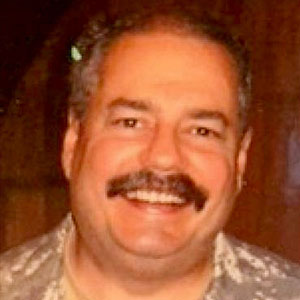
Kevin was a former Special Forces weapons man (MOS 18B, before the 18 series, 11B with Skill Qualification Indicator of S). His focus was on weapons: their history, effects and employment. He started WeaponsMan.com in 2011 and operated it until he passed away in 2017. His work is being preserved here at the request of his family.
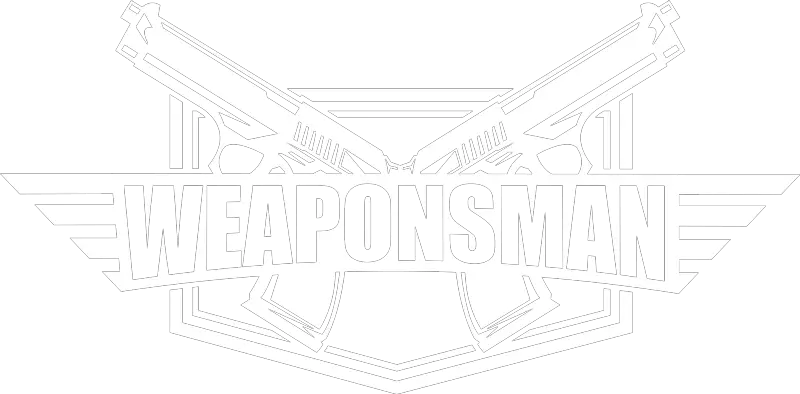
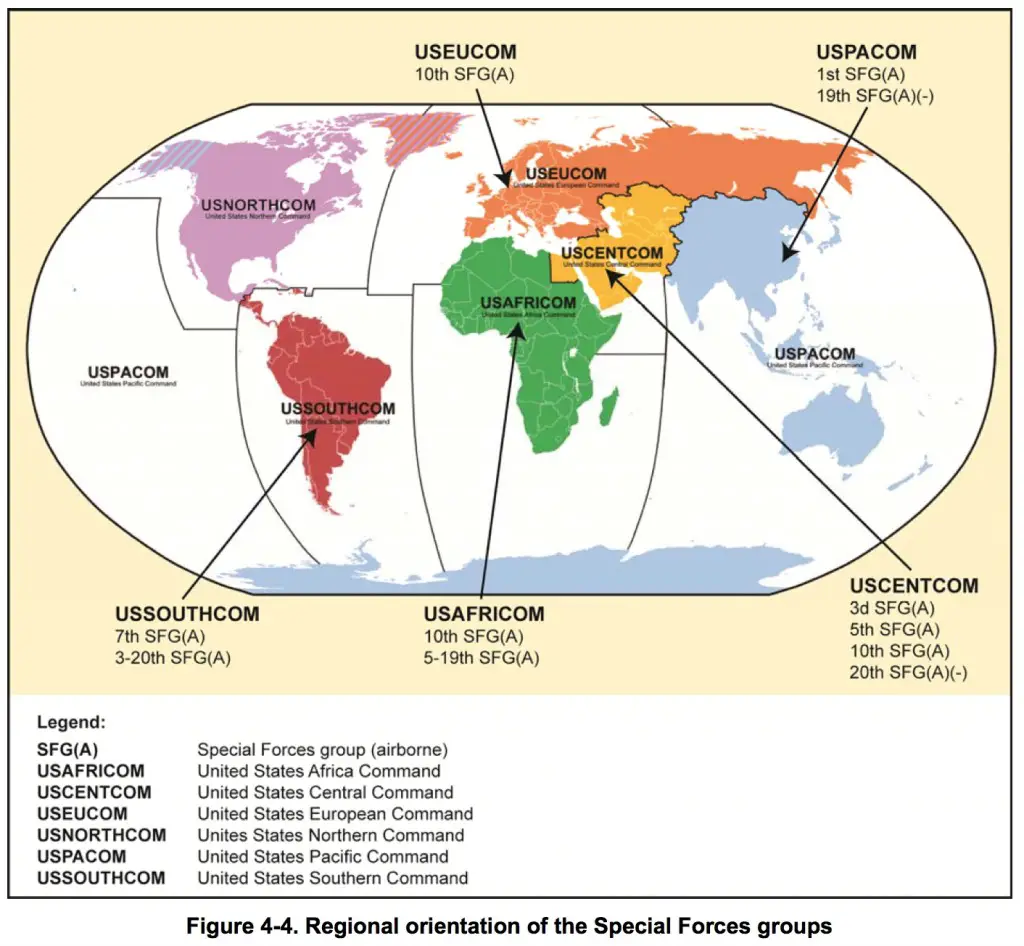
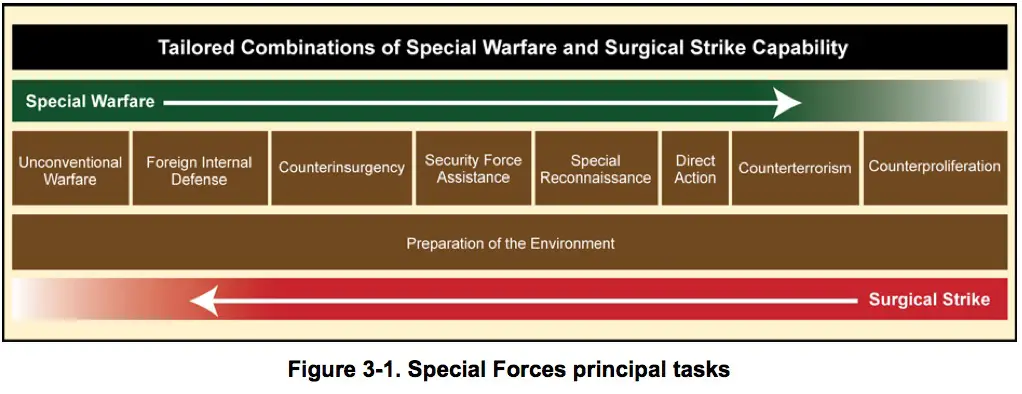
3 thoughts on “SF Doctrine: Field Manual 3-18”
From introduction FM 3-18:
“UW is the primary mission that most distinguishes SF. The inherently interagency, multinational, and widely dispersed activities of UW are conducted to enable a resistance movement or insurgency by operating through or with an underground, auxiliary, or guerrilla force in denied areas to coerce, disrupt, or overthrow oppressive regimes. UW operations are politically sensitive activities that involve a high degree of military risk and, therefore, require distinct authorities and innovative campaign design. The demands of UW missions require mature SF Soldiers who are adept at interacting with a wide range of actors and agencies capable of, and trusted with, sensitive and largely independent operations. The payoff—what makes SF UW activities worth the risk to forces in a denied area—is the subsequent weak defensive posture the enemy must take in order to defend everything and thereby defend nothing well.”
Is that doctrine? Or is it something else?
Who ultimately decides what falls under this sanction of waging UW, and who decides who is ally and who is foe. I have to wonder, as in this day we as people not of the military are faced with an adversarial array of elected and unelected government officials, and private sector power brokers, who are determined to deny we as people our basic liberties and freedoms in the pursuit of greater wealth and unlimited power to decide what is right and not right for us.
The above mention adversarial officials do they not constitute the same structure of power and influence on the political scale that determines how where and why SF are utilized and deployed?
This is, in my opinion, two separate questions:
Who ultimately decides what falls under this sanction of waging UW?
That’s a military decision to be taken by SOF senior leaders, when tasked by NCA.
…and who decides who is ally and who is foe?
That is, in every nation-state now, and in all of history, a political decision. It can only be a political decision. It’s true that in history some militaries have injected themselves into politics (the Praetorians in Rome; the Imperial Japanese; various Latin American nabobs and satraps). Has any of those ended well? (A few actually have: South Korea is one example. One of the lesser lessons of history is that authoritarian military leaders can indeed step down; totalitarian leaders can’t and won’t, they ride the tiger to the end).
Those are some really cogent points you make WM.
I think what interests me most is the “crossing of the Rubicon” in the context of the time which comes to us.
History is instructive yet it isn’t a crystal ball, it is at best cautionary. And here is where the question of commission verses omission is relative. And the catalyst, the sanction, the power behind or above which drives the NCA also.
Yet we are all human, we all put our pants on one leg at a time. And we are all unfortunately subject to social engineering that seems to insinuate itself into every facet of our nation of late. It seems to be a trend today in which the politicization or I should say, the infusion of politically correct doctrine into the warrior culture of our military is a priority, where it originates I can only make more or less educated assumptions from a myriad of sources which themselves have to be taken with caution. Though it seems to me the elimination of traditional Christian values and mores, and the imposition of traditionally taboo social constructs, upon the rank and file is a rather insidious turn of events. But that is a truly personal point of view, and it would be presumptuous at best to impose it as a point of argument. Even though, I think, and admire, the US military in at least one respect in which it possesses a very unique characteristic unlike almost any military in history to my knowledge. It has rapidly adapted to and in its own unique fashion, embraced social paradigms and come out better for it. Regardless of its detractors and antagonists. And regardless of the chore and challenges of doing so. Again much to its great credit. That in itself speaks volumes alone.
I know many things can be read into these things we speak of, for who knows the mind of those who have their pet political agendas and their ultimate goals, but they strike me as totally unwholesome and detrimental to the code of honor and virtue of traditional military culture and life. Let alone civilian life. And that is where the crux of trust of the military is important to many outside the military. Your and your brothers in uniform have tribal knowledge of the character and culture which outsiders can never fully know. And there has to be a level of trust here in the intentions and virtue of all involved. None of us exist in a vacuum, we are all connected in some way, no matter how remote or different. Don’t forget who has all the things that go boom and who excel at breaking things. That is a caveat which if ignored is ignored at great potential peril, as your comments above imply. For if those who have the political power to implement their political goals and or ideology anathema to the idea of the intended structure of our military as intended, and guaranteed in our founding, are enabled through whatever mechanisms to use the military for their own means, that paramount trust is broken no matter the character and quality of those who wear the uniform.
I believe that trust is everything. In some way, it is something which holds this civil society together. And we can ill afford to loose that trust today. It is a perishable thing too, it requires constant upkeep and maintenance, much to out chagrin and misfortune. I remember all too clearly the time of the Vietnam war. That was terrible and sordid what transpired because of the malice and intent of nefarious political cunning and meddling.
I know I must be presenting a kind of Schrodingers Cat, or maybe it is tossing Ocamm’s Razor kind of observation out there, but is a good to question those who presume to rule over us, good to question their motives and intents, but it is not good that our military is placed in the middle and used as pawns in a less than clear, and maybe less than honest game of power and intrigue. And neither is it good that a vast portion of our great society are used as useful dupes to the same ends.
Maybe it is obvious to some, but it may bear telling, because we can never ignore the truth or it has a nasty potential of biting one on the arse, but 10, or 20 years ago, or more, Jade Helm would be something accepted as quite appropriate by the vast majority of American’s. But today, in the current atmosphere of acts such as the Patriot Act, the NDDA, the rampant spying by our government into our personal affairs, the use of executive “powers” to circumnavigate the checks and balances of power within the structure of our constitutional government, the wild abandon of regulatory and administrative law imposed willy nilly across the entire sphere of our lives by unaccountable mandarins who in many cases constitute a criminal class of untouchables, the arming up and increasing militaristic character of almost every regulatory bureaucracy of the federal government, the constant attempts by the political and executive branches to deny, and criminalize our property such as firearms and their use, not to mention the right to defend hearth and kin, and dare I say Liberty, never mind the federal created lists of who is deemed a “potential domestic terrorist”? Potential domestic insurgency? Is Habeas Corpus a living concept to be changed at the will and pleasure of an elite few at the expense of the disenfranchised multitude? If so, in light of these things, would it be unreasonable to cast a hint of doubt upon SF UW exercises which has the purpose of practicing fighting counter insurgency warfare in concert with civilian and federal law enforcement, an exercise taking place in our towns and cities and across our states? The concept of Posse Comitatus comes to mind.
I hope like hell my words are taken in the light given, that they give pause to thoughtfulness and not construed or conflated to reflect in poor light upon the honor and virtue of Americans in uniform. But in the light it is a duty to question those in power, to question the veracity and motives of those who wield much power. I believe it is healthy and beneficial to our republic and its continuation.
To vilify, or belittle those who question flies in the face of proper government. For if the intents of government are wholesome and honest, where is there reason to paint those who question in a poor light, as many who are classified on domestic terrorist list indeed are.
As I may well be for voicing my opinions and insights right here.
But furthermore, aside from defending our individual liberties and freedoms each ourselves, who is supposed to be the protectors of our freedoms and liberties, our way of life, our rule of law, and the principles of Judea Christian values which our form of government originated upon? Which is the basis of how our military was constructed.